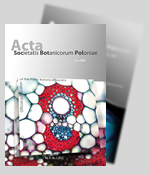Influence of heat stress on leaf morphology and nitrogen–carbohydrate metabolisms in two wucai (Brassica campestris L.) genotypes
Abstract
Keywords
Full Text:
PDFReferences
Kotak S, Larkindale J, Lee U, Vonkoskulldoring P, Vierling E, Scharf K. Complexity of the heat stress response in plants. Curr Opin Plant Biol. 2007;10(3):310–316. https://doi.org/10.1016/j.pbi.2007.04.011
Wahid A, Gelani S, Ashraf M, Foolad MR. Heat tolerance in plants: an overview. Environ Exp Bot. 2007;67:199–223. https://doi.org/10.1016/j.envexpbot.2007.05.011
Wollenweber B, Porter JR, Schellberg J. Lack of interaction between extreme high temperature events at vegetative and reproductive growth stages in wheat. J Agron Crop Sci. 2003;189:142–150. https://doi.org/10.1046/j.1439-037X.2003.00025.x
Yang KA, Lim CJ, Hong JK, Park CY, Cheong YH, Chung WS, et al. Identification of cell wall genes modified by a permissive high temperature in Chinese cabbage. Plant Sci. 2006;171(1):175–182. https://doi.org/10.1016/j.plantsci.2006.03.013
Lima RB, dos Santos TB, Vieira LGE, Ferrarese MLL, Ferrarese-Filho O, Donatti L, et al. Heat stress causes alternations in the cell-wall polymers and anatomy of coffee leaves (Coffea arabica L.). Carbohydr Polym. 2013;93:135–143. https://doi.org/10.1016/j.carbpol.2012.05.015
Cao YY, Chen YH, Chen MX, Wang ZQ, Wu CF, Bian XC, et al. Growth characteristics and endosperm structure of superior and inferior spikelets of indica rice under high-temperature stress. Biol Plant. 2016;60(3):532–542. https://doi.org/10.1007/s10535-016-0606-6
Maestri E, Klueva N, Perrotta C, Gulli M, Nguyen HT, Marmiroli N. Molecular genetics of heat tolerance and heat shock proteins in cereals. Plant Mol Biol. 2002;48:667–681. https://doi.org/10.1023/A:1014826730024
Stone P. The effects of heat stress on cereal yield and quality. In: Basra AS, editor. Crop responses and adaptations to temperature stress. Binghamton, NY: Food Products Press; 2001. p. 243–291.
Yuan H, Sun Y. Correlation and path analysis of some agronomic characters of savoy (Brassica chinensis var. rosulars Tsen et Lee.). China Vegetables. 2001;5:17–18.
Shao L, Wang CG, Song JH, Zhang H, Wang SS, Yang J. Relationship of major morphological characteristics with low temperature tolerance in savoy. Journal of China Agricultural University. 2014;19:95–102.
Zou MQ, Yuan LY, Zhu SD, Liu S, Ge JT, Wang CG. Effects of heat stress on photosynthetic characteristics and chloroplast ultrastructure of a heat-sensitive and a heat-tolerant cultivar of wucai (Brassica campestris L.). Acta Physiol Plant. 2017;39:30. https://doi.org/10.1007/s11738-016-2319-z
Zou MQ, Yuan LY, Zhu SD, Liu S, Ge JT, Wang CG. Response of osmotic adjustment and ascorbate–glutathione cycle to heat stress in a heat-sensitive and a heat-tolerant genotype of wucai (Brassica campestris L.). Sci Hortic (Amsterdam). 2016;211:87–94. https://doi.org/10.1016/j.scienta.2016.08.011
Yuan LY, Liu S, Zhu SD, Chen GH, Liu F, Zou MQ, et al. Comparative response of two wucai (Brassica campestris L.) genotype to heat stress on antioxidative system and cell ultrastructure in root. Acta Physiol Plant. 2016;38:223. https://doi.org/10.1007/s11738-016-2246-z
Medina E, Garcia V, Cuevas E. Sclerophylly and oligotrophic environments: relationships between leaf structure, mineral nutrient content, and drought resistance in tropical rain forests of the upper Rio Negro region. Biotropica. 1990;22:51–64. https://doi.org/10.2307/2388719
Cataldo DA, Haroon M, Schrader LE, Youngs VL. Rapid colorimetric determination of nitrate in plant tissue by nitration of salicylic acid. Commun Soil Sci Plant Anal. 1975;6:71–80. https://doi.org/10.1080/00103627509366547
Solorzano L. Determination of ammonia in natural waters by the phenolhypochlorite method. Limnol Oceanogr. 1969;14:799–801. https://doi.org/10.4319/lo.1969.14.5.0799
Foyer CH, Valadier MH, Migge A, Becker TW. Drought-induced effects on nitrate reductase activity and mRNA and on the coordination of nitrogen and carbon metabolism in maize leaves. Plant Physiol. 1998;117:283–292. https://doi.org/10.1104/pp.117.1.283
Yuan LY, Yuan YH, Du J, Sun J, Guo SR. Effect of 24-epibrassinolide on nitrogen metabolism in cucumber seedlings under Ca(NO3)2 stress. Plant Physiol Biochem. 2012;61:29–35. https://doi.org/10.1016/j.plaphy.2012.09.004
Lin CC, Kao CH. Disturbed ammonium assimilation is associated with growth inhibition of roots in rice seedlings caused by NaCl. Plant Growth Regul. 1996;18:233–238. https://doi.org/10.1007/BF00024387
Singh RP, Srivastava HS. Regulation of glutamate dehydrogenase activity by amino acids in maize seedlings. Physiol Plant. 1983;57:549–554. https://doi.org/10.1111/j.1399-3054.1983.tb02784.x
Aurisano N, Bertani A, Reggiani R. Involvement of calcium and calmodulin in protein and amino acid metabolism in rice roots under anoxia. Plant Cell Physiol. 1995;36:1525–1529. https://doi.org/10.1080/11263509509440949
Buysse J, Merckx R. An important colorimetric method to quantify sugar content of plant tissue. J Exp Bot. 1993;44:1627–1629. https://doi.org/10.1093/jxb/44.10.1627
Lowell CA, Tomlinson PT, Koch KE. Sucrose-metabolising enzymes in enzymes in transport tissue and adjacent sink structures in developing citrus fruit. Plant Physiol. 1989;90:1394–1402. https://doi.org/10.1104/pp.90.4.1394
Bird IF, Cornelius MJ, Keys AJ, Whittingham CP. Intracellular site of sucrose synthesis in leaves. Phytochemistry. 1974;13:59–64. https://doi.org/10.1016/S0031-9422(00)91267-6
Morell M, Copeland L. Sucrose synthase of soybean nodules. Plant Physiol. 1985;78:149–154. https://doi.org/10.1104/pp.78.1.149
Arai M, Mori H, Imaseki H. Roles of sucrose-metabolizing enzymes in growth of seedlings. Purification of acid invertase from growing hypocotyls of mung bean seedlings. Plant Cell Physiol. 1991;32(8):1291–1298.
Mohammad SH, Katrine HK, Eva R, Dew KS, Carl-Otto O. Heat stress and recovery of photosystem II efficiency in wheat (Triticum aestivum L.) cultivars acclimated to different growth temperatures. Environ Exp Bot. 2014;99:1–8. https://doi.org/10.1016/j.envexpbot.2013.10.017
Kumar S, Kaur R, Kaur N, Bhandhari K, Kaushal N, Gupta K, et al. Heat-stress induced inhibition in growth and chlorosis in mungbean (Phaseolus aureus Roxb.) is partly mitigated by ascorbic acid application and is related to reduction in oxidative stress. Acta Physiol Plant. 2011;33:2091–2101. https://doi.org/10.1007/s11738-011-0748-2
Bacelar EA, Correia CM, Moutinho-Pereira JM, Gonçalves BC, Lopes JI, Torres-Pereira JM. Sclerophylly and leaf anatomical traits of five field-grown olive cultivars growing under drought conditions. Tree Physiol. 2004;24:233–239. https://doi.org/10.1093/treephys/24.2.233
Han M, Ji C, Zuo W, He J. Interactive effects of elevated CO2 and temperature on the anatomical characteristics of leaves in eleven species. Front Biol (Beijing). 2007;2(3):333–339. https://doi.org/10.1007/s11515-007-0049-8
Dominique L, Pascal L, Alain G. Gene expression of the NO3− transporter NRT1.1 and the nitrate reductase NIA1 is repressed in Arabidopsis roots by NO2−, the product of NO3− reduction. Plant Physiol. 2003;132:958–967. https://doi.org/10.1104/pp.102.018523
Ingram J, Bartels D. The molecular basis of dehydration tolerance in plants. Annu Rev Plant Biol. 1996;47(1):377–403. https://doi.org/10.1146/annurev.arplant.47.1.377
Thum KE, Shasha DE, Lejay LV, Coruzzi GM. Light- and carbon-signaling pathways. Modeling circuits of interactions. Plant Physiol. 2003;132:440–452. https://doi.org/10.1104/pp.103.022780
Gutierrez RA, Lejay LV, Dean A, Chiaromonte F, Shasha DE, Coruzzi GM. Qualitative network models and genome-wide expression data define carbon/nitrogen-responsive molecular machines in Arabidopsis. Genome Biol. 2007;8:R7. https://doi.org/10.1186/gb-2007-8-1-r7
Sinsawat V, Leipner J, Stamp P, Fracheboud Y. Effect of heat stress on photosynthetic apparatus in maize (Zea mays L.) grown at control or high temperature. Environ Exp Bot. 2004;52:123–129. https://doi.org/10.1016/j.envexpbot.2004.01.010
Lv WT, Lin B, Zhang M, Hua XJ. Proline accumulation is inhibitory to Arabidopsis seedlings during heat stress. Plant Physiol. 2011;156:1921–1933. https://doi.org/10.1104/pp.111.175810
Morsy MR, Jouve I, Hausman JF, Hoffmann J, Stewart JM. Alteration of oxidative and carbohydrate metabolism under abiotic stress in two rice (Oryza sativa L.) genotypes contrasting in chilling tolerance. J Plant Physiol. 2007;164:157–167. https://doi.org/10.1016/j.jplph.2005.12.004
Keunen E, Peshev D, Vangronsveld J, van den Ende W, Cuypers A. Plant sugars are crucial players in the oxidative challenge during abiotic stress: extending the traditional concept. Plant Cell Environ. 2013;36:1242–1255. https://doi.org/10.1111/pce.12061
Nguyen-Quoc B, Foyer CH. A role for “futile cycles” involving invertase and sucrose synthase in sucrose metabolism of tomato fruit. J Exp Bot. 2001;52(358):881–889. https://doi.org/10.1093/jexbot/52.358.881
Awasthi R, Kaushal N, Vadez V, Turner NC, Jens Berger J, Siddique KHM, et al. Individual and combined effects of transient drought and heat stress on carbon assimilation and seed filling in chickpea. Funct Plant Biol. 2014;41:1148–1167. https://doi.org/10.1071/FP13340
Li Z, Palmer WM, Martin AP, Wang R, Rainsford F, Jin Y, et al. High invertase activity in tomato reproductive organs correlates with enhanced sucrose import into, and heat tolerance of young fruit. J Exp Bot. 2012;63:1155–1166. https://doi.org/10.1093/jxb/err329
Kaushal N, Awasthi R, Gupta K, Gaur P, Siddique KHM, Nayyar H. Heat-stress induced reproductive failures in chickpea (Cicer arietinum L.) are associated with impaired sucrose metabolism in leaves and anthers. Funct Plant Biol. 2013;40:1334–1349. https://doi.org/10.1071/FP13082
Agopian RGD, Peroni-Okita FHG, Soares CA, Mainardi JA, do Nascimento JO, Cordenunsi BR, et al. Low temperature induced changes in activity and protein levels of the enzymes associated to conversion of starch to sucrose in banana fruit. Postharvest Biol Technol. 2011;62:133–140. https://doi.org/10.1016/j.postharvbio.2011.05.008
Phan TTT, Ishibashi Y, Miyazaki M, Tran HT, Okamura K, Tanaka S, et al. High temperature-induced repression of the rice sucrose transporter (OsSUT1) and starch synthesis-related genes in sink and source organs at milky ripening stage causes chalky grains. J Agron Crop Sci. 2013;199:178–188. https://doi.org/10.1111/jac.12006
Krause KP, Hill L, Reimholz R, Nielsen TH, Sonnewald U, Stitt M. Sucrose metabolism in cole-stored potato tubers with decreased expression of sucrose phosphate synthase. Plant Cell Environ. 1998;21:285–299. https://doi.org/10.1046/j.1365-3040.1998.00271.x
DOI: https://doi.org/10.5586/asbp.3554
|
|
|







